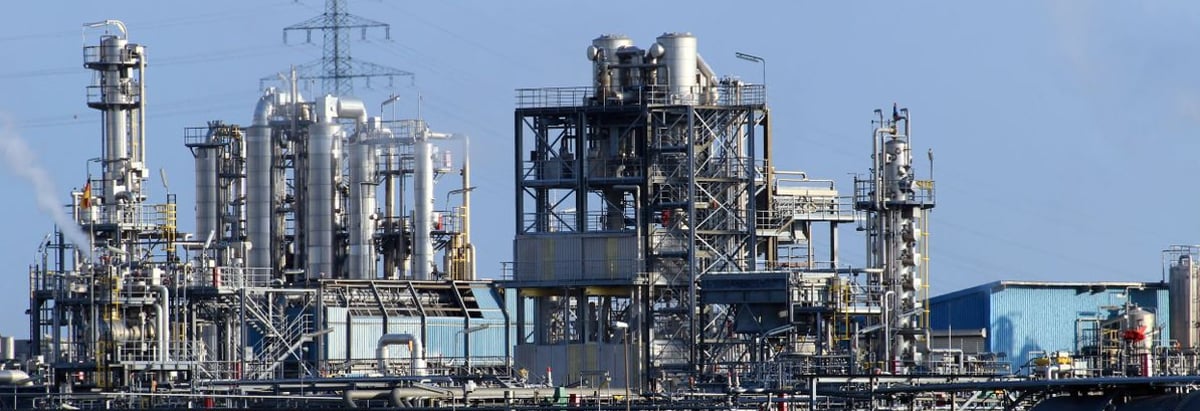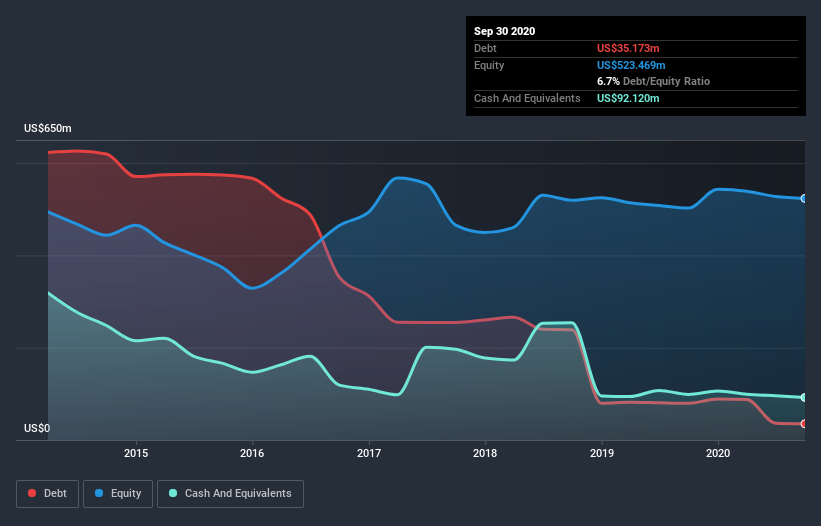- United States
- /
- Oil and Gas
- /
- NasdaqGS:CLNE
Here's Why Clean Energy Fuels (NASDAQ:CLNE) Can Manage Its Debt Responsibly

Some say volatility, rather than debt, is the best way to think about risk as an investor, but Warren Buffett famously said that 'Volatility is far from synonymous with risk.' So it seems the smart money knows that debt - which is usually involved in bankruptcies - is a very important factor, when you assess how risky a company is. As with many other companies Clean Energy Fuels Corp. (NASDAQ:CLNE) makes use of debt. But should shareholders be worried about its use of debt?
When Is Debt Dangerous?
Debt assists a business until the business has trouble paying it off, either with new capital or with free cash flow. Part and parcel of capitalism is the process of 'creative destruction' where failed businesses are mercilessly liquidated by their bankers. However, a more usual (but still expensive) situation is where a company must dilute shareholders at a cheap share price simply to get debt under control. Of course, debt can be an important tool in businesses, particularly capital heavy businesses. When we think about a company's use of debt, we first look at cash and debt together.
View our latest analysis for Clean Energy Fuels
How Much Debt Does Clean Energy Fuels Carry?
You can click the graphic below for the historical numbers, but it shows that Clean Energy Fuels had US$35.2m of debt in September 2020, down from US$79.4m, one year before. But it also has US$92.1m in cash to offset that, meaning it has US$56.9m net cash.

How Healthy Is Clean Energy Fuels' Balance Sheet?
We can see from the most recent balance sheet that Clean Energy Fuels had liabilities of US$79.3m falling due within a year, and liabilities of US$60.6m due beyond that. On the other hand, it had cash of US$92.1m and US$77.0m worth of receivables due within a year. So it can boast US$29.2m more liquid assets than total liabilities.
This state of affairs indicates that Clean Energy Fuels' balance sheet looks quite solid, as its total liabilities are just about equal to its liquid assets. So while it's hard to imagine that the US$2.54b company is struggling for cash, we still think it's worth monitoring its balance sheet. Simply put, the fact that Clean Energy Fuels has more cash than debt is arguably a good indication that it can manage its debt safely.
We also note that Clean Energy Fuels improved its EBIT from a last year's loss to a positive US$25m. When analysing debt levels, the balance sheet is the obvious place to start. But ultimately the future profitability of the business will decide if Clean Energy Fuels can strengthen its balance sheet over time. So if you want to see what the professionals think, you might find this free report on analyst profit forecasts to be interesting.
Finally, while the tax-man may adore accounting profits, lenders only accept cold hard cash. Clean Energy Fuels may have net cash on the balance sheet, but it is still interesting to look at how well the business converts its earnings before interest and tax (EBIT) to free cash flow, because that will influence both its need for, and its capacity to manage debt. Happily for any shareholders, Clean Energy Fuels actually produced more free cash flow than EBIT over the last year. There's nothing better than incoming cash when it comes to staying in your lenders' good graces.
Summing up
While we empathize with investors who find debt concerning, you should keep in mind that Clean Energy Fuels has net cash of US$56.9m, as well as more liquid assets than liabilities. The cherry on top was that in converted 146% of that EBIT to free cash flow, bringing in US$36m. So is Clean Energy Fuels's debt a risk? It doesn't seem so to us. The balance sheet is clearly the area to focus on when you are analysing debt. But ultimately, every company can contain risks that exist outside of the balance sheet. For example, we've discovered 2 warning signs for Clean Energy Fuels that you should be aware of before investing here.
Of course, if you're the type of investor who prefers buying stocks without the burden of debt, then don't hesitate to discover our exclusive list of net cash growth stocks, today.
If you’re looking to trade Clean Energy Fuels, open an account with the lowest-cost* platform trusted by professionals, Interactive Brokers. Their clients from over 200 countries and territories trade stocks, options, futures, forex, bonds and funds worldwide from a single integrated account. Promoted
If you're looking to trade Clean Energy Fuels, open an account with the lowest-cost platform trusted by professionals, Interactive Brokers.
With clients in over 200 countries and territories, and access to 160 markets, IBKR lets you trade stocks, options, futures, forex, bonds and funds from a single integrated account.
Enjoy no hidden fees, no account minimums, and FX conversion rates as low as 0.03%, far better than what most brokers offer.
Sponsored ContentNew: AI Stock Screener & Alerts
Our new AI Stock Screener scans the market every day to uncover opportunities.
• Dividend Powerhouses (3%+ Yield)
• Undervalued Small Caps with Insider Buying
• High growth Tech and AI Companies
Or build your own from over 50 metrics.
This article by Simply Wall St is general in nature. It does not constitute a recommendation to buy or sell any stock, and does not take account of your objectives, or your financial situation. We aim to bring you long-term focused analysis driven by fundamental data. Note that our analysis may not factor in the latest price-sensitive company announcements or qualitative material. Simply Wall St has no position in any stocks mentioned.
*Interactive Brokers Rated Lowest Cost Broker by StockBrokers.com Annual Online Review 2020
Have feedback on this article? Concerned about the content? Get in touch with us directly. Alternatively, email editorial-team (at) simplywallst.com.
About NasdaqGS:CLNE
Clean Energy Fuels
Offers natural gas as alternative fuels for vehicle fleets and related fueling solutions in the United States and Canada.
Adequate balance sheet and fair value.
Similar Companies
Market Insights
Community Narratives





